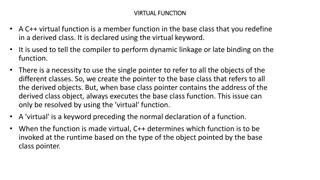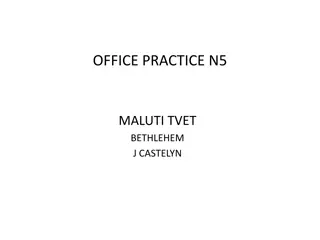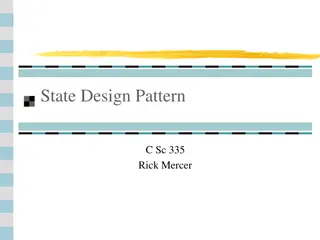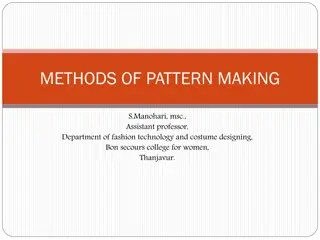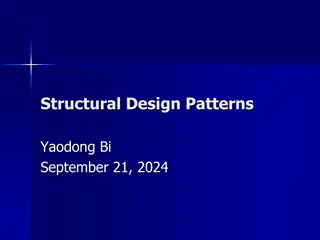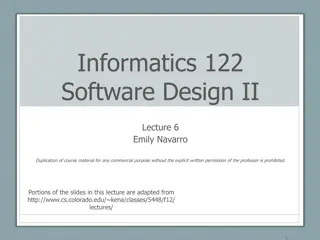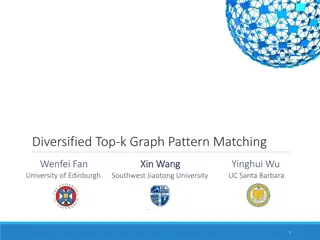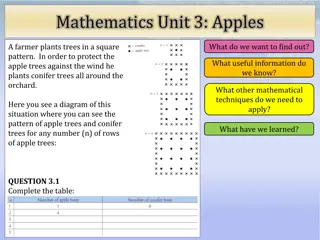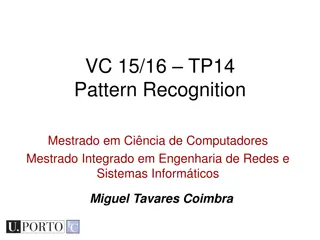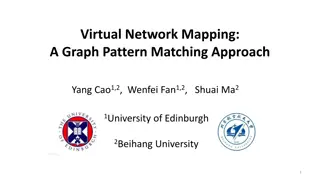Understanding Virtual Functions and Visitor Pattern in C++
Virtual functions in C++ allow for dynamic polymorphism by defining a set of functions in base classes that can be overridden in derived classes. The visitor pattern is a design pattern that lets you define a new operation without changing the classes of the elements on which it operates. This pattern involves abstract visitor and object classes, concrete object classes, and concrete visitor classes to facilitate the operations.
Download Presentation

Please find below an Image/Link to download the presentation.
The content on the website is provided AS IS for your information and personal use only. It may not be sold, licensed, or shared on other websites without obtaining consent from the author. Download presentation by click this link. If you encounter any issues during the download, it is possible that the publisher has removed the file from their server.
E N D
Presentation Transcript
Virtual functions The set of virtual functions (and their signatures) is fixed by the definition of the base class Virtual functions can not be templates The required functionality must be anticipated when the base class is defined Any extensions change the interface between the base class and any derived classes any change is expensive All the implementations of a virtual function are present in the executable code, even if the virtual function is never called The code generation for a virtual function is triggered by the generation of a constructor of the enclosing class Acceptable when functionality is fixed and the set of different implementations (concrete classes) grows E.g. printer drivers Problematic when the set of concrete classes is fixed and the required functionality grows E.g. intermediate code (AST) objects inside an optimizing compiler NPRG041 Programov n v C++ - 2019/2020 2 David
Visitor pattern Forward-declare all concrete object classes class ConcreteObject1; class ConcreteObject2; Define the abstract visitor class with a virtual function for every concrete object class Traditionally named visit, sometimes distinguished as visitConcreteObject1, ... class AbstractVisitor { public: virtual ~AbstractVisitor() noexcept {} virtual void visit(ConcreteObject1 & x) = 0; virtual void visit(ConcreteObject2 & x) = 0; }; Define a virtual function in the abstract object class, accepting a reference to the abstract visitor Traditionally named accept Other virtual functions may be declared in the abstract class for direct invocation without a visitor class AbstractObject { public: virtual ~AbstractObject() noexcept {} virtual void accept(AbstractVisitor & v) = 0; /*...*/ }; Implement the accept function in every concrete object class, calling the corresponding visit function class ConcreteObject1 : public AbstractObject { virtual void accept(AbstractVisitor & v) override { v.visit(*this); } /*...*/ }; class ConcreteObject2 : public AbstractObject { virtual void accept(AbstractVisitor & v) override { v.visit(*this); } /*...*/ }; NPRG041 Programov n v C++ - 2019/2020 3 David
Visitor pattern class AbstractVisitor { public: virtual void visit(ConcreteObject1 & x) = 0; virtual void visit(ConcreteObject2 & x) = 0; }; class AbstractObject { public: virtual void accept(AbstractVisitor & v) = 0; }; class ConcreteObject1 : public AbstractObject { virtual void accept(AbstractVisitor & v) override { v.visit(*this); } }; /*...*/ Usage: define a concrete visitor class for every action required Implement the visit function for every concrete object class Data elements may be present in the concrete visitor (cf. capture in functors) class ConcreteVisitorA : public AbstractVisitor { virtual void visit(ConcreteObject1 & x) override { /*...*/ } virtual void visit(ConcreteObject2 & x) override { /*...*/ } /*...*/ }; Instantiate the concrete visitor and pass it to the accept function Fill visitor data elements before and/or retrieve their values after calling accept void invokeA(AbstractObject * p) { ConcreteVisitorA cv; /* fill cv... */ p->accept(cv); /* retrieve from cv... */ } NPRG041 Programov n v C++ - 2019/2020 4 David
Visitor pattern - memory layout class AV { public: virtual void visit(O1 & x) = 0; virtual void visit(O2 & x) = 0; }; class AO { public: virtual void accept(AV & v) = 0; }; class O1 : public AO { virtual void accept(AV & v) override { v.visit(*this); } }; class O2 : public AO { virtual void accept(AV & v) override { v.visit(*this); } }; class VA : public AV { virtual void visit(O1 & x) override { A_1(x); } virtual void visit(O2 & x) override { A_2(x); } }; class VB : public AV { virtual void visit(O1 & x) override { B_1(x); } virtual void visit(O2 & x) override { B_2(x); } }; AO * p = /*...*/; VA cv; p->accept(cv); this x this x p p O1AO O2AO AO AO accept AO-O1 accept AO-O2 accept this v cv VAAV VBAV AV AV visitO1 visitO2 AV-VA visit01 visit02 AV-VA visit01 visit02
Visitor pattern functionality Instantiate the concrete visitor and pass it to the accept function ConcreteVisitorA cv; The concrete visitor object is initialized with type information according to the action Plus any data required for the action This is one of the few legitimate cases of non-dynamically allocated object with inheritance p->accept(cv); Implicit cast of the visitor reference from the concrete visitor to the abstract visitor The code forgets the action required (it remains remembered in the run-time data) Virtual call to accept, using the type information stored in the abstract object (*p) Dispatch to the implementation corresponding to the object type Simultaneously, cast this pointer from the abstract object (*p) to a concrete object void ConcreteObject1::accept(AbstractVisitor & v) { v.visit(*this); Virtual call to visit, using the type information stored in the abstract visitor (v) Dispatch to the implementation corresponding to the visitor type Simultaneously, cast this pointer from the abstract visitor (v) to the concrete object void ConcreteVisitorA::visit(ConcreteObject1 & x) { The code being executed is now specialized to both the object type and the action required A case of double-dispatch NPRG041 Programov n v C++ - 2019/2020 6 David
Virtual functions vs. visitor Set of virtual functions Fixed set of actions Interface of the abstract object Extensible set of object types New concrete object classes may be defined without modifying the abstract class Visitor pattern Extensible set of actions New concrete visitors may be defined without modifying abstract (object and visitor) classes Fixed set of object types Interface of the visitor Higher run-time cost Two indirect calls NPRG041 Programov n v C++ - 2019/2020 7 David
Visitor pattern and lambda A concrete visitor may invoke a functor/lambda template< typename F> class FunctorVisitor : public AbstractVisitor { public: FunctorVisitor( F f) : f_( std::move(f)) {} private: F f_; virtual void visit(ConcreteObject1 & x) override { f_(x); } virtual void visit(ConcreteObject2 & x) override { f_(x); } }; Statically polymorphic functor/auto lambda is required accept and visit are virtual run-time polymorphism accept dispatches according to the object type visit dispatches according the functor/lambda type (forgotten through accept) operator() is a template (due to the auto argument) compile-time polymorphism compiler creates two implementations of operator() called by f_(x) void invokeA(AbstractObject * p) { FunctorVisitor cv([](auto && x){ x.something(); }); p->accept(cv); } Class Template Argument Deduction [C++17]: compiler derives the class template argument F from the type of constructor argument in the initialization both concrete objects must contain (non-virtual) member function something NPRG041 Programov n v C++ - 2019/2020 9 David
Visitor pattern and lambda operator() may be overloaded in a functor compile-time polymorphism struct ftorA { void operator()(ConcreteObject1 & x) { x.something(); } void operator()(ConcreteObject2 & x) { x.something_else(); } }; void invokeA(AbstractObject * p) { FunctorVisitor cv(ftorA()); p->accept(cv); } polymorphic ftorA vs. concrete visitor: ftorA is not derived from AbstractVisitor, operator() are not virtual non-virtuality allows tricks impossible with visitors: struct ftorA { void operator()(ConcreteObject1 & x) { x.something(); } template<typename O> void operator()(O && x) { x.something_default(); } }; especially useful if the object-type hierarchy contains intermediate abstract objects: struct ftorA { void operator()(IntermediateObjectA & x) { x.something_in_A(); } void operator()(IntermediateObjectB & x) { x.something_in_B(); } template<typename O> void operator()(O && x) { x.something_default(); } }; the functor may contain less functions than an equivalent visitor simplest cases may be handled by a lambda run-time cost is roughly the same as for visitors dominated by the two virtual calls accept+visit, the non-virtual calls are negligible NPRG041 Programov n v C++ - 2019/2020 10 David
Visitor pattern The statically-polymorphic interface may be wrapped into the AbstractObject It makes the underlying visitor mechanism invisible class AbstractObject { public: virtual ~AbstractObject() noexcept {} template<typename F> void accept_static(F f) { accept( FunctorVisitor(std::move(f))); } private: virtual void accept(const AbstractVisitor & v) = 0; }; Usage: p->accept_static([](auto && x){ x.something(); }); The statically-polymorphic functors (supplied to accept_static) may sometimes adapt automatically to a new concrete object type The underlying AbstractVisitor and FunctorVisitor must still be manually adjusted The (polymorphic) functor is usually passed by value It does not support self-modifying functors (mutable lambdas) Programmers are used to this from library algorithms etc. Visitors must always passed by reference Otherwise the virtual functions would not work This corresponds to the observation that objects with inheritance have their identity NPRG041 Programov n v C++ - 2019/2020 11 David
Visitor pattern Trick: Combining lambdas into a polymorphic functor template< typename F1, typename F2> class mixer : public F1, public F2 { public: mixer(F1 f1, F2 f2) : F1(std::move(f1)), F2(std::move(f1)) {} using F1::operator(); using F2::operator(); }; The using clauses hoist the operators into a common scope Otherwise, calling operator() will fail due to ambiguity overload resolution is done only after determining single class scope for the called function template< typename F1, typename F2> auto operator|(F1 f1, F2 f2) { return mixer<F1,F2>(std::move(f1),std::move(f2)); } Usage: p->accept_static( [](ConcreteObject1 & x){ x.something(); } |[](auto && x){ x.something_default(); } ); Beware: This is grossly ineffective for functors containing (the same) data p->accept_static( [a,b,c](ConreteObject1 & x){ x.something(a,b,c); } |[a,b,c](auto && x){ x.something_default(a,b,c); } ); NPRG041 Programov n v C++ - 2019/2020 12 David






